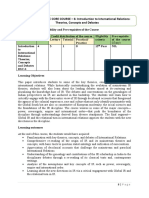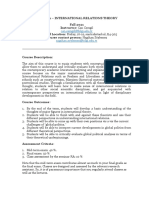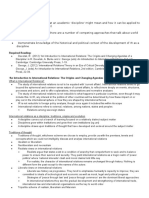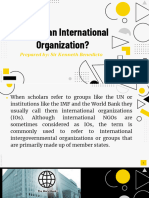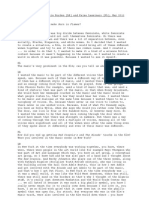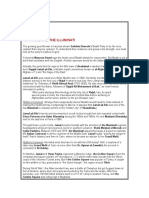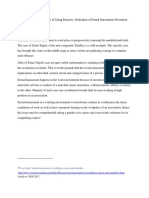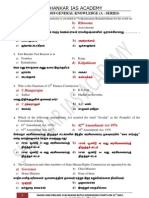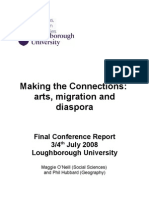Category Il
Political Sclence Courses for Undergraduate Programme of study
with Political Science as one of the Core Disciplines
(B.A. Programmes with Political Science as Major discipline)
DISCIPLINE SPECIFIC CORE COURSE (DSC-5A): Introduction to International
Relations
CREDIT DISTRIBUTION, ELIGIBILITY AND PRE-REQUISITES OF THE
COURSE
Course title Credits Credit distribution of the Eligibility Pre
& Code course criteria requisite
Lecture Tutorial Practical of the
Practice course
(if any)
Introduction 4 3 -
NA NA
to
International
Relations
MDSC-5A
Learning Objectives
Thi troduces students todieeinliee
the historical and conceptual foundations of the discipllne of IR
tdiercourse introduces Stuoe
ltion oft the in he hee of the Second World War with theories
being its main foundation and the lens through whlch it understood and explained the world. The
disputations and challenges to these theories led to the emergence of "debates which are then
discussed and understood as the disciplines' dominant 'self-image'. This is followed by an
elaboration of the discipline's major theoretical frameworks, each giving a different picture of the
world - realism/neorealism, liberalism/neoliberalism, Marxism/Neo-Marxism and feminism. The
course then examines major concepts-such as power, state and human rights. Students will also
learn about the glotbal governance with a case study of climate change negotiations. Finally, the
course introduces scholarship from India within the wider context of Global South towards the
development of a more inclusive IR froma Non-Western perspective.
Learning outcomes
At the end of the course students will be able to:
. Understand the ways in which IR as a discipline evoved from a Eurocentric vantage
point to the emergence of a critical movement to shape a more inclusive, historlcal and
a global IR.
" Appreciate the ways in which scholarship from postcolonlal countries such as India
contribute to understanding the world around us.
Analyse key concepts and concerns of IR such as war and peace, state, sovereignty
and human rights to understand how these forces shape the wortd towards more
efficlent global governance.
Develop critical understandings of power hierarchies and unequal relationships
through the lens of feminism and Marxism.
Understand the important aspects of Non-Western IR that can help students
investigate and shape the future course of the discipline.
" Develop a basic understanding of the Indian contributions to the discipline of
international relations.
104
SYLLABUS OF MDSC-5A
UNIT -I(9 Hours)
Disciplinary history of International Relations
1.1. What is International Relations?
1.2. Debates: ldealism/Realism &Science/Classical Methods, Inter-paradigm
Debate
UNIT -I| (16 Hours)
Theorles of International Relations
2.1. Realpolitik/Realism/Neo-realism
2.2. Liberalism/Neo-liberalism
2.3. Marxism/Neo-Marxism
2.4. Feminism
UNIT - III (14 Hours)
Concepts & Issues
3.1. State and Sovereignty
3.2. War and Peace
3.3. Human Rights
3.4. Global governance: climate change negotiations
UNIT-IV (6 Hours)
IR Beyond Eurocentrism
4.1 Non-western Perspectives
Indian Contributions to International Relations
Essential/lrecommended readings
Unit 1. Disciplinary history of IR
1.1, What is IR?
Essential Readings
Grieco, Joseph, John lIkenberry and Michael Mastanduno, (2014) Introduction to International
Relations: Enduring Questions and Contemporary Perspectives, New York: Palgrave
Macmillan, Chapter one, pp. 2-30
Vetak Richard, ,Anthony Burke and Jim George, (2007), An introduction to International
Cambridge: Cambrinbridge University Press, Introduction, pp. 1-18.
Additional Readings
Mansbach, Richard W. and Kirsten LTaylor, 2008, Introduction to Global Politics, New York:
Routledge, Chapter two, pp. 1-32.
Reus-Smit. Christian, 2020, A Very short introduction to International Relations, Oxford
University Press, Chapter one, 7-27.
1.2. Debates: ldealism/Reallsm & SclenceClassical Methods and Inter-paradlgm
Debate
Essential Readings
�Tim Dunne. Milia Kurki. and Steve Smith, (eds.) (2013), Intemational Relations Theories.
Discipline and Diversity, Oxford University Press: UK, 3rd edition. Chapter one. pp. 1-13.
Mansbach, Richard W. and Kirsten LTaylor, (2008), Introduction to Global Politics, New York:
Routledge, Chapter one. pp 9-24.
Waever, 0., (1996). The rise and fall of the inter-paradigm debate. In S. Smith, K. Booth, &M.
Zalewski (Eds.), International theory: Positivism and beyond. Cambridge: Cambridge
University Press. pp. 149-185.
Additional Readings
Weber, Cynthia, (2005), Intemational Relations Theory: A Critical Introduction, London:
Routledge. Chapter one. pp. 1-12.
Mearsheimer, J. (2005), "E.H. Carr vs ldealism: The Battle Rages On", International Relations,
19(2), pp. 139-153.
Mingst A. Karen and Jack L. Snyder (2017), Woodrow Wilson: The Fourteen Points, Essential
Readings in World poitics, 6h edition, US: W.W. Norton and Company, pp. 32-34.
Unit 2: Theories of IR
2.1. Realpolitik/Reallsm/Neo-realism
Essential Readings
Nirmal Jindal. (2020). Kautilya's Realpolitik 'in Nirmal Jindal, Kamal Kumar, (eds.)
Do 451-170.
rnational Relations: Thed yand Practice, Sage Publications, India. Pp.
Interna
Baylis, John and Steve Smith (2001). "Realism", The Globalisation of Worid Politics: An
Introduction to International Relations, New York: Oxford University Press. pp. 141-161.
Additlonal Readings
Malviya, Ritambhara (2020), "Realism and neorealism", in Nirmal Jindal, Kamal Kumar, (eds.)
International Relations: Theory and Practice, Sage Publications, India. pp.151-170., Chapter
4, 59-74
Richard Ned Lebow, "Classical Realism," and John J. Mearsheimer, "Structural Realism," in
Tim Dunne, Milja Kurki, and Steve Smith, (eds.) (2013) International Relations Theories,
Discipline and Diversity. Oxford University Press: UK, 3rdedition, pp. 59-93.
Waltz, Kenneth, An Interview on a Theory of International Relations and the Role of structure,
Online at http://globetrotter.berkeley.edu/people3/Waltz/waltz-con0.html
2.2. Liberalism/Neo-iberalism
Essential Readings
Baylis, John and Steve Smith (2001), Liberalism", The Globalisation of World Politics: An
Introduction to International Relations, New York: Oxford University Press. pp. 162-181.
Robert Jackson, Georg Sørensen (2019). 'Liberalism 'in Introduction to International
Relations, Theories and Approaches, Oxford University Press: New York, Chapter 4, pp.107
142.
Additional Readings
Jon C. W. Pavehouse and Joshua S. Goldstein, (2018). "Chapter 3-Liberal and Social
Theories," in International Relations, 11th Edition, Pearson: New York, pp. 83-121.
Doyle, Michael W. (1986), "Liberalism and World Politics, The American Political Science
Review,. December, Vol, 80, no, 4. pp.1151-1169,
Keohane, Robert O. (2012), Twenty Years of Institutional liberalism", International Relations.
26:2, pp. 125-138.
106
2.3. Marxism/Neo-Marxism
Essential Readings
Hobden Stephen and Richard Wyn Jones (2014), "Marxist theories of International Relations,
in John Baylis, Steve Smith and Patricia Owens (et.al), The Globalization of World Politics,
Sixth Edition, UK: Oxford, pp.116-129.
Wallersteln, Analysis",
Comparative vsls" in Michael Smith and Richard Little (eds), Perspectives
), I. (2000). The Rise and Future Demise of World Capitalist System: Con cepts for
Worid
Politics, New York: Routledge, pp. 305
Additional Readings
Mark Rupert, (2013). "Marxism 'in Tim Dunne, Milja Kurki, and Steve Smith, (eds.)
International Relations Theories, Discipline and Diversity. Oxford University Press: UK, 3rd
edition. pp.153-170.
Davenport, Andrew, "Marxism in IR: Condemned to a Realist Fate?", European Joumal of
International Relations, 19 (1), 2013:27-48.
Goldstein, J. and Pevehouse, J. (2007), lnternational Relations, New York: Pearson Longman,
Pp. 494-496; 500-503.
Wallerstein, Immanuel (1995), "The Inter-State Structure of the Modern World System", in:
Steve Smith, Ken Booth and Marysia Zalewski (eds.), International Theory: Positivism and
Beyond, Cambrldge: Cambridge University Press, pp.87-107.
2.4. Feminism
Essential Readings
Ann Tickner, J., (2008). 'Gender in Worid Politics', in Baylis, J. and Smith, (et al.). The
Globalization of World Politics. Oxford: Oxford Unlversity Press. pp. 262-277.
Pelerson, V. Spike, ed. Gendered States: Feminist (Re)Visions of International Relations
Theory. Boulder, CO: Lynne Rienner, 1992. Chapter one. pp. 31-64.
Additional Readings
Seema Naraln, (2014) "Gender in International Relations: Feminist Perspectives of J. Ann
Tickner Indian Journal of Gender Studies, Vol 21 (2), pp. 179-197.
Steans, JlI (1998), Gender and International Relations: An Introduction, Cambridge, Blackwell
publishers, pp.10-39.
Young, G. (2004), "Feminist International Relations: A Contradiction in Terms? Or: Why
Women and Gender are Essential to Understanding the World 'We 'Live," International Afairs,
80 (1), pp.75-87.
Unit 3: Concepts & lssues
3.1. State and Sovereignty
Essential Readings
Navnita Chadha Behera, (2020). 'State and Sovereilgnty, 'in Arlene B. Tckner and Karen
Smith, eds, International Relations trom the Global South: Worlds of Ditference, London:
Routledge: pp.139-160.
Reus-Smit, Christian, 2020, A Very shot introduction to International Relations, Oxford
University Press, Chapter four, 87-112.
Additional Readings
�Lake, David A. (2008), "The State and International Relations", in The Oxford Handbook of
International Relations, Christian Reus Smit and Duncan Snidal (ed), London: Oxford
University Press.
Biersteker, Thomas, J. (2002), 'State, Sovereignty and Territory, 'Sage Handbook of
International Relations, London: Sage Publications. pp. 207-234.
Osiander, A. (2001), "Sovereignty, Intermational Relations, and the Westphalian Myth",
International Organization, [online) 55(2), PP.251-287. Available at
https://www.cambridge.org/coreljournalsinternational-organization/article/sovereignty
international-relations-and-the-westphalian
3.2. War and Peace
Essential Readings
Joseph Grieco, G. John Ikenberry and Michael Mastanduno, (2015), Chapter 5 on "War and
its Causes" and, Chapter 6 "Pathways to Interstate Peace," in Introduction to International
Relations: Enduring Questions and Contemporary Perspectives, London: Palgrave 2015, pp.
137-204.
Additional Readings
Gray, Colin S. (2012), War, Peace and International Relations: An Introduction to Strategic
History, London: Routledge, pp. 245-261, 279-306.
Robert Ayson, "The Changing Nature of Warfare," in Devetak, Richard, Anthony Burke and
Jim George, (2007), An introduction to International Relations, Cambridge: Cambridge
University Press, pp. 199-216.
Gurr, Ted and Bartbara Hartff, (2018), Ethnic Conftlict in World Politics: Dilemmas in World
Politics, Chapter one. 24-55.
3.3. Human Rights
Essential Readings
Brown, Chris, "Human Rights, in Baylis, John and Steve Smith (2008), The Globalisation of
World Politics: An Introduction to International Relations, 4h Edition, New York: Oxford
University Press, pp. 506-521.
Baxi, Upendra (2002), "An Age of Human rights? in Baxi, Upendra, The Future of Human
Rights, Oxford University Press, Delhi, pp. 1-32
Additional Readings
Clapham, Andrew, (2015),Avery short introduction to human rights, New Delhi: OUP. Chapter
two and three - (The historical development of international human rights, Human rights
foreign policy and the role of the United Nations pp. 22-80.
Anthony J. Langlois, "Human Rights," in Devetak, Richard, Anthony Burke and Jim George,
(2007), An introduction to International Relations, Cambridge: Cambridge University Press,
pp.440-449,
3.4. Global governance and climate change negotlations
Essential Readings
Weiss, Thomas G, (2013) "What is global governance" in Global Governance: Why? What?
Whither?, New York: Polity, 90-127
Agarwal, Anil and Sunita Narain (1991), Global Warming and Unequal World:A Case of
Environmental Colonialism, Centre for Science and Environment, Delhi, pp. 81-91.
Additional Readings
108
Heywood, Andrew, (2011) "Global Governance and the Bretton Woods System,* in Global
Politics, New York: Palgrave Macmillan, pp. 461-484.
Sengupta, s. (2012), "international Climate Negotiations and India's Role", in N.K. Dubash
(ed.), Handbook of Climate Change and India: Development, Politics and Governance, New
Delhi, Routledge.
Andonova, L. B., Betsill, M. M., & Bulkeley, H. (2009), "Transnational climate governance"
Global Environmental Politics, 9 (2), 52-73.
Unlt 4: R Beyond Eurocentrism
4.1. Non-Western Perspectives
Essential Readings
Blaney, David L.. and Inayatullah, Naeem (2009), "International Relations from Below" in
Christian Reus Smit and Duncan Snidal, (ed.), The Oxford Handbook of Intermational
Relations, Oxford: Oxford University Press, 2008, pp. 663-674.
Amitav Acharya and Barry Buzan, "Why is there no non-Western international relations
theory? An introduction", International Relations of the Asia-Pacific, 7:3, September 2007, pp
287-312.
Additional Readings
Bilgin, Pinar. "Thinking Past Western IR. Third Worid Quarterly. 29, no, 1 (2007): 5-23.
Capan, Z (2016), "Decolonising International Relations?" Third World Quarterty. [online]
38(1), pp.1-15. Available at
https://www.tandfonline.com/dolabs/10.1080/01436597.2016.1245100 [Accessed 10 Nov.
2018].
4.2. Indian Contrlbutions to IR
Essontial Reading(s)
Behera, N. C. (2013) "Introduction," in India Engages the World. (Political science: 4.) New
Delhi: Oxford University Press, pp. 1-55.
Additlonal Reading(s)
Kanti Bajpai and Siddharth Mallavarapu, (2019) (eds.), "Introduction," in India, the West and
International Order, New Delhi: Orient Black Swan, pp. 1-52.
A.K. Ramakrishnan, "The Gaze of Orientalism: Reflections on Linking Postcolonialism and
International Relations," in Kanti Bajpai and Siddharth Mallavarapu, (eds.). International
Relations in India: Bringing Theory Back Home, New Delhi: Orient Longman, pp. 223-274.
Reference Literature:
Kumar, Mahendra (2017). Theoretical Aspects of International Politics. New Delhi, Shiva lal
Agarwal Publication.
Held, D., Mc Grew, A. et al. (eds) (1999) Global Transformation Reader: Politics, Economics
and Culture, Stanford: Stanford University Press.
Wenger, A. and Zimmermann, D. (eds.) (2003) International Relations: From the Cold World
War to the Globalized World. London: Lynne Rienner.
Smith, M., Little, R. and Shackleton, M. (eds.) (1981) Perspectives on Wordd Politics. London:
Croom Helm.
Art, R. J. and Jervis, R. (eds.) (1999) International Political Enduring: Concepts and
Contemporary lssues. 5th Edition. New York: Longman, pp. 7-14; 29-49; 119-126.



